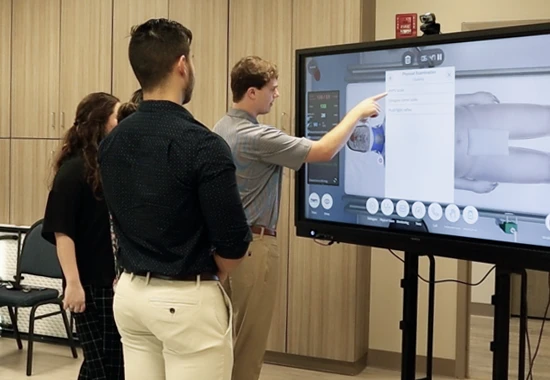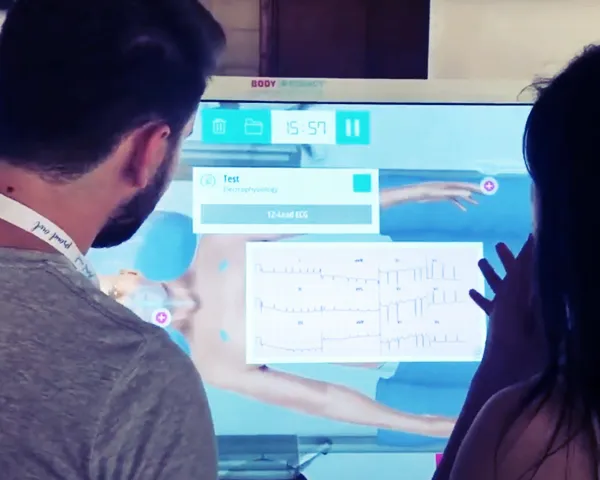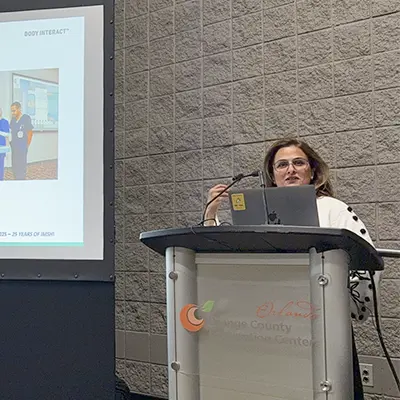
Virtual Patient Simulation for Medical Education
Body Interact offers a realistic and risk-free training environment for medical students and professionals through life-like virtual patient encounters.
- Cultivate critical thinking and clinical reasoning skills
- Promote patient safety and high-quality care
- Improve knowledge retention and teamwork
Medical Programs
Suitable for
MD, DO
Doctor of Medicine / Doctor of Osteopathic Medicine
Body Interact curriculum is based on the USMLE Content Outline offering an array of clinical conditions – bolstering knowledge and patient-centered skills while preparing students for their role as a licensed physician.
PA
Physician Assistant
Aligned to the Content Blueprint for the Physician Assistant National Certifying Examination, our scenarios aid students in developing patient-centered knowledge in preparation for their role as PA.
The benefits of simulated-based learning
Foster medical students competencies
Promote success for medical educators
Curriculum integration
Body Interact is a cost-effective solution for Medical Education thanks to our extensive library of ready-made clinical cases. Select from scenarios that correlate to your MD / DO / PA learning outcomes – resulting in a comprehensive and cohesive learning experience that bridges theoretical knowledge and practical application. See curriculum specifics below.
Customized scenarios
Tailor clinical scenarios to your institution’s curriculum and learning objectives. Ensure content relevance and accuracy to suit national and local protocols and guidelines.
Active learning
Deliver dynamic simulation-based learning experiences. Modernize traditional medical education through evidence-based simulation in your classroom, simulation center, or at home.
Data-driven debriefing
Support learner progress by tracking performance and assessing proficiencies at the end of each scenario. Reinforce points of knowledge, provide constructive feedback, and validate acquired clinical competencies.
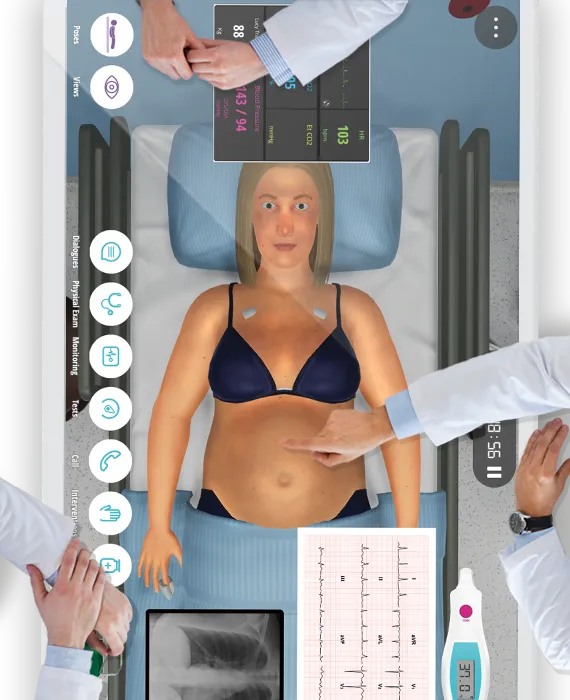
Educational Excellence
Global Impact Study in Clinical Education
Satisfaction
Were highly satisfied with using Body Interact as a new learning tool
Learning gaps
Stated that Body Interact allowed them to bridge learning gaps
Decision-making
Believe that Body Interact helped students to practice decision-making strategies
Feedback
Felt that Body Interact provided rich feedback
Body Interact for medical education
Explore the different strategies to implement Body Interact – Virtual Patient Simulator.
From remote to in-person learning opportunities.
Classroom
Foster confidence and engagement among medical students through teacher-led sessions or small group practice.
Simulation Center
Promote experiential learning. Enhance clinical competence, teamwork, and interdisciplinary collaboration.
Individual training
Assign clinical scenarios according to learning objectives. Practice anytime, anywhere, testing skills and knowledge.
Competency-based assessment
Track student progress with performance analytics through Body Interact’s Learning Management System
BI Studio
Performance assessment
After every virtual case, Body Interact provides users with a time-stamped report that lists all user actions during the simulation, the health conditions untreated, and the vital signs of the patient, at each moment.
Explore our instructor guides, debriefing tools, and performance analytics that aid you in training your students to achieve effective, quality patient care.
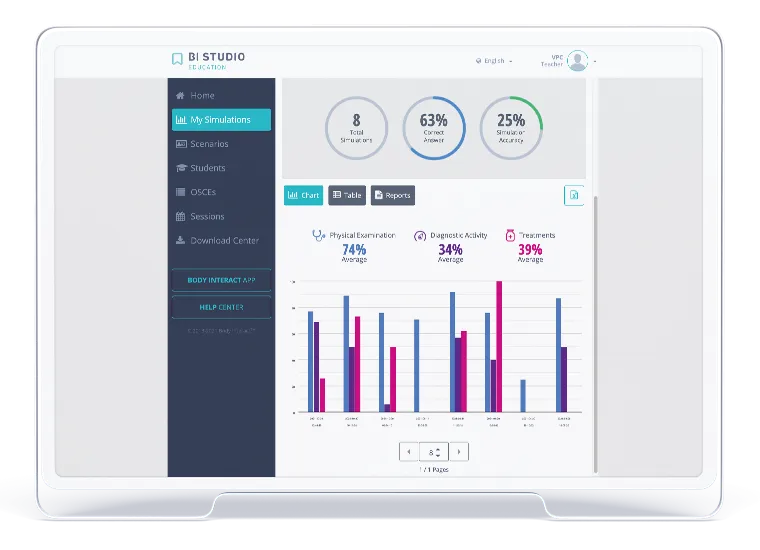
Objective Structured Clinical Examination (OSCE)
Provide a standardized foundation for assessing knowledge and skills with one or multiple virtual patient scenarios.
Through OSCE scenarios, you will boost confidence and cultivate expertise among future and current healthcare professionals. Achieve cost and time efficiency for educators and the institution, ensure seamless curriculum integration, and promote effective data analysis and organization.
What's new on Body Interact
Discover the latest improvements and get inspired by the Body Interact community. Explore new approaches in healthcare education.
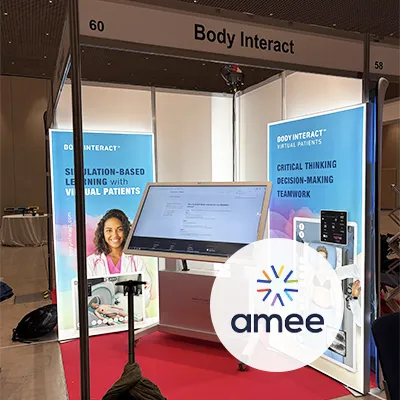
Body Interact at AMEE 2025

Virtual Patients as Preclinical Experiences for Meaningful Disciplinary Learning
Evidence-based simulation
Body Interact medical curriculum
Integrate immersive and innovative interventions into your teaching. Deliver high-quality medical education experiences and ensure the alignment with Medical competency standards
Our content is based on the United States Medical Licensing Examination® (USMLE®) for MD and DO programs. For PA programs, it is based on the Content Blueprint for the Physician Assistant National Certifying Examination (PANCE)
Allergy / Immunology
Acute allergic angioedema
Anaphylatic shock
Anaphylaxis
Hereditary angioedema
Cardiology
Acute coronary syndromes
Anticoagulation management
Arrhythmias
Cardiometabolic disease
Cardiovascular angiography
Congenital Heart disease
Geriatric cardiology
Heart failure and cardiomyopathies
Hypertension
Pericardial disease
Pulmonary hypertension
Stable ischemic heart disease
Valvular heart disease
Vascular medicine
Venous thromboembolism
Endocrinology
Adrenal health and disease
Cardiovascular endocrinology
Diabetes and glucose metabolism
Dyslipidemia
Obesity
Thyroid disorders
Dentistry
Common tongue tag
Ectopic eruption
Herpetic gingivostomatitis
Incisive-molar hypomineralization
Irreversible pulpitis
Pulpal necrosis
Pulpitis with symptomatic apical periodontitis
Pyogenic granuloma
Reversible pulpitis
Emergency medicine
Airway management/Respiratory failure
Emerging infections
Opioid
Resuscitation
Sepsis
Shock
Trauma
Endocrinology
Adrenal health and disease
Cardiovascular endocrinology
Diabetes and glucose metabolism
Dyslipidemia
Obesity
Thyroid disorders
Family medicine
Cardiovascular disease risk
Diabetes
Gestational diabetes
Hypertension
Lipid disorders
Thyroid dysfunction
Gastroenterology
Bowel disorders
Colorectal cancer
Esophageal & gastric disorders
Liver diseases
Pancreatic disorders
Intensive medicine
Acute respiratory distress syndrome
Airway management
Difficult airway
Mechanical ventilation
Internal medicine
Adverse drug events
Geriatrics
Hypertension
Lipids and cardiovascular risk management
Obesity and weight management
Substance abuse and addiction
Nephrology / Urology
Acute kidney disease
Bladder cancer
Chronic kidney disease
End-stage renal disease
Neurology
Alzheimer disease
Cerebrovascular disease/Stroke
Cognitive disorders/Dementia
Epilepsy/Seizures
Imaging
Infections
Ob/Gyn and women's health
Acute pulmonary embolism
Chorioamnionitis
Eclampsia
Ectopic pregnancy
Placental abruption
Postpartum hemorrhage
Preeclampsia
Pregnancy
Premature rupture of membranes
Sepsis
Shoulder dystocia
Umbiliacal cord prolapse
Psychiatry
Depression
Illicit drug use
Psychotic disorders
Suicide
Pulmonology
Asthma
COPD
Cystic fibrosis
Lung cancer
Mechanical ventilation
Pneumonia
Pulmonary arterial hypertension
Toxicology
Alcohol intoxication
Carbon monoxide poisoning
Drug intoxication
Opioid intoxication
Trauma and acute care surgery
Blunt cardiac injury
Critical care illness
Pelvis injuries
Rib fractures
Splenic trauma
Traumatic brain injury
General surgery
Bowel disease
Sepsis
Trauma
Oncology
Bladder cancer
Colorectal cancer
Lung cancer
Pancreatic cancer
Tropical medicine
Malaria
Infectious diseases
Emerging infectious diseases
Hepatitis
Infective endocarditis
Pneumonia
Sepsis
Vascular surgery
Aortic abdominal aneurism
Deep vein thrombosis
Vascular disease
